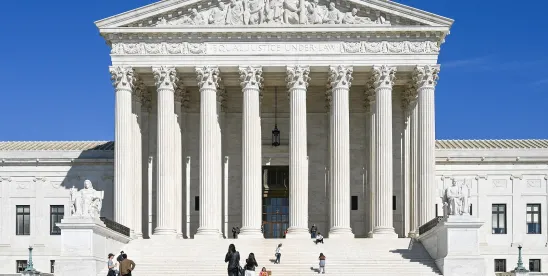On June 27, 2024, the Supreme Court released its opinion in Securities and Exchange Commission v. Jarkesy, which weakens the enforcement power of administrative agencies to adjudicate certain matters within the agency itself. The Court found that, when the SEC seeks civil penalties against a defendant for securities fraud, the defendant is entitled to a jury trial under the Seventh Amendment. Because the SEC’s antifraud provisions mirror common law fraud, the SEC’s enforcement action was akin to a “private right,” which implicates the Seventh Amendment right to a jury trial, as compared to certain “public rights” that are an exception to the Seventh Amendment right to a jury trial.
This decision will likely spur a wave of litigation regarding many executive agencies to examine whether their adjudications implicate “public rights” or “private rights” and thus entitle the respondent-entity to a jury. One of the agencies likely to be challenged is the Office of Federal Contract Compliance Programs (“OFCCP”). OFCCP sues government contractors and subcontractors through the Department of Labor’s in-house administrative courts to enforce non-discrimination provisions of Executive Order 11246, which follows Title VII of the Civil Rights Act of 1964 precedent, Section 503 of the Rehabilitation Act, Vietnam Era Veterans' Readjustment Assistance Act, and other applicable rules and regulations, which are additional obligations required by the (sub)contractors contract with the federal government. As these actions are suits to enforce contractual obligations, they mirror common law breach of contract actions, and arguably fall within the scope of “private rights.” Like the SEC seeking civil penalties in Jarkesy, the OFCCP seeks monetary damages which are “the prototypical common law remedy.” Jarkesy, Slip. Op. at 9.
The Supreme Court left additional questions open in Jarkesy that may further weaken certain agencies’ adjudication powers. For example, the Fifth Circuit opinion in Jarkesy held that the SEC’s Administrative Law Judges’ insulation from removal by the President was an unconstitutional violation of separation of powers. The Supreme Court did not reach this issue because it concluded that the resolution of the Seventh Amendment question was enough to decide the case. Because the Court did not overturn the Fifth Circuit’s holding on the removal theory, the Court may entertain the theory at a future time, which could in turn further impact the landscape of administrative agency adjudicatory proceedings.





 />i
/>i

